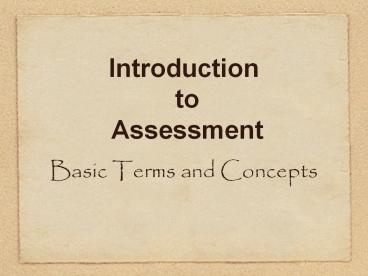Introduction%20to%20Assessment - PowerPoint PPT Presentation
Title:
Introduction%20to%20Assessment
Description:
Title: Introduction to Assessment Last modified by: C. R. Auxier Document presentation format: On-screen Show Other titles: Papyrus Pro W3 Marker ... – PowerPoint PPT presentation
Number of Views:313
Avg rating:3.0/5.0
Title: Introduction%20to%20Assessment
1
Introduction to Assessment
- Basic Terms and Concepts
2
Why Assess?
- Read the classroom culture
- Understand the characteristics of a particular
group of students - Plan instruction, group students
3
Why Assess?
- Get periodic feedback regarding teaching
effectiveness, formative - Diagnose problems
- Make final judgments about teaching strategies,
summative
4
Types of Assessment
- Early
- Instructional
- Official
5
Types of Assessment
- 1. Early Assessment
- Students characteristics
- Teachers characteristics
- Classroom and teaching resources
- Informal, observational
6
Types of Assessment
- 2. Instructional Assessment
- Howzit going? (Are they getting it?)
- Formal (tests) and informal (observations)
- Flexibility
- Adjustments
7
Types of Assessment
- 3. Official Assessments
- Required by Administration
- Formal tests and assignments
- Results recorded in gradebook
- Formative and summative
8
Terminology
Assessment
Umbrella term that includes
Testing (collecting data) Measurement (converting
to numbers) Evaluation (converting numbers to
letters)
9
Collecting Data
- Paper and Pencil Tests
- Selection items (Choose an answer)
- Supply items (Create an answer)
- Performance Assessments
- Processes (Measures performances)
- Music, athletics, speeches, etc.
- Products (Measures tangible outcomes)
- Art, essays, poetry, shop projects, etc.
10
Collecting Data
- Observation
- Watching, listening, taking notes
- Oral Questioning
- Group, private
11
More Terminology
- Standardized Tests
- Administered, scored, and interpreted exactly the
same for all test takers - SAT, ACT, GRE, etc.
- Nonstandardized Tests
- Classroom tests
12
More Terminology
- Validity
- Does it measure what it is
- supposed to measure?
- Phrenologists say that it is possible to know
personality and intelligence from reading the
bumps and shape of ones head. Valid?
13
More Terminology
- Reliability
- Measurements that are consistent
- in a variety of situations
- You should get the same results with each
measurement
14
Validity vs. Reliability
- Measuring ones head to judge intelligence is not
valid, but it is reliable. - (You will get the same measurement each time
(reliable), but the measurement does not measure
what it is supposed to measure (personality,
intelligence), therefore it is not valid.
15
Ethical Considerations
- Fair and impartial
- Adequate preparation must be provided for tests
- Commitment to students welfare
- Accommodations when needed
- Validity (tests must be an accurate measure of
student characteristics)
16
(No Transcript)































